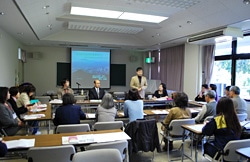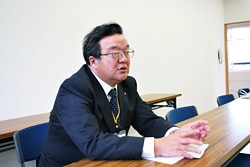



[IWATE, JAPAN, 16 November 2012]
November is Child Abuse Prevention Promotion Month. On 16 November, with the cooperation of the Japan National Council of Child Family Support Center, the Japan Committee for UNICEF (JCU) held training workshops in Rikuzentakata City and Ofunato City (Iwate Prefecture) for a total of 30 local government staff and individuals involved in assisting children at the local level, including municipal government staff and consultants working with households with children, health nurses, nursery staff, child coaches, civil and child committee members, and child consultation centre staff.
This project is part of the Child Assistance Training Series put on by JCU. The training series emphasizes prioritizing child protection in areas affected by the Great East Japan Earthquake in order to protect the human rights of children, prevent violence and continue to support children in regaining their will to live during the reconstruction process.
According to materials released by the Ministry of Health, Labour and Welfare, the number of consultation cases related to child abuse received at child consultation centres nationwide increased 4.8-fold in 2010 compared to 1999 when the Child Abuse Prevention Act was enacted. Against this backdrop, three key areas have been identified the top priorities to combatting child abuse: 1) preventing the occurrence of abuse; 2) early discovery and early response; and 3) protecting and supporting children and their caretakers.
Concrete measures related to early discovery and early response have been given particular focus, including enforcing stricter adherence to notification systems and strengthening the structures of child consultation centres and municipal governments. Moreover, in order to promote early discovery, proper protection and assistance for children in need, there are calls for establishing Local Committees on Countermeasures for Children in Need of Protection (Local Committees) in order to protect children through collaboration and information sharing with relevant agencies and municipal governments.
Much of the operation of Local Committees has been delegated to local governments. The theme for the current training sessions is to consider how to make operations of Local Committees more effective in consideration of the special characteristics of each municipal government.
 |
| A training session in Ofunato City. Ms. Sakaguchi, a chief consultant at the Children's Support Centre Amagiyama in Omuta City, leads the discussion. To her right is Mr. Hisashi, deputy head of the Beautiful Smile Center, a child support centre located in Beppu City. |
During the training, Mr. Hisashi, deputy head of the Beautiful Smile Center in Beppu City, delivered an overview of the activities of his child and family support centre, which also hosts a foster home. For one of their projects, the Beppu Children's Welfare Academy, a monthly event is held with a case study, mini seminar and group discussion. The Academy aims to substantially support Beppu City in the operation of Local Committees. The majority of Local Committees, which convene twice a year, focus on reporting on activities of the year.
According to Mr. Hisashi, the case study aims to expand stakeholders' networks and provide an opportunity to exchange views on how to respond to cases taking into account their respective areas of specialty. This process, says Mr. Hisashi, puts people in physical contact so that when they return to their workplaces to assist children they will have other people that they are comfortable contacting in the event that a child has special needs. "The important thing is maintaining lateral ties in order to prevent any one person from carrying the entire burden him or herself," he says.
 |
| "It is important, regardless how time consuming, to train aid workers in order to create an environment that allows for safely raising our children," says Mr. Sugano, the manager of the Social Welfare Section, Civil Affairs Department, Rikuzentakata City Office. |
Next, Ms. Sakaguchi, a chief consultant at the Children's Support Centre Amagiyama in Omuta City, provided an overview of the situation at the Omuta City Children's Support Network, the city's Local Committee. Ms. Sakaguchi pointed out that, against a backdrop where child abuse by parents is common, "We cannot simply blame the parents. We must understand the importance of parent involvement in society in light of the fact that many parents feel compelled to engage in child abuse."
Ms. Sakaguchi also pointed out the need for collaboration that takes into account substantially conflicting perspectives on welfare and education, as well as the importance of yoshien (need for assistance) efforts in addition to yohogo (need for protection). She noted: "The reason that Local Committees are needed is because it is more efficient for people and organizations close to a child to respond to calls for assistance. A single agency might have trouble putting aid into motion. There is a great deal of assistance that can only be provided by people close around."
Ms. Sakaguchi added, "Everyone does not have to become a specialist. As long as you are connected with other specialists, you can resolve the issues that you face. One framework that makes this possible is the Local Committee. In a partnership people do not give work to others; they work to increase friendships that are mutually supportive. It is of the utmost importance that aid workers try to build friendships during times of emergency." In response to this easy-to-understand explanation, many participants told the Japan Committee for UNICEF that they were able to reconfirm the necessity of Local Committees.
Later, Mr. Owada and Mr. Funano of the Children's Support Center Taiyo, an organization active in Rikuzentakata and Ofunato Cities, reported on the situation of Local Committees in their respective cities and shared future challenges with the participants.
After the training concluded, Mr. Sugano, the manager of the Social Welfare Section, Civil Affairs Department, Rikuzentakata City Office, spoke his views about the conclusion of the training series: "Providing development assistance to children contributes to future urban development. It is important, regardless how time consuming, to train aid workers in order to create an environment that allows for safely raising our children. Thanks to the assistance of the Japan Committee for UNICEF and others, we have achieved a great deal in the year since the disaster."
Mr. Sugano commented on the need for government to raise their antenna: "Following the disaster, the living environment has undergone many changes, and stress at home is mounting. This is likely to lead to increased risk of child abuse. The key to eradicating this risk is quickly gathering information related to individual households and children."
Mr. Yamagishi, head of Ofunato City's Community Welfare Section, Welfare Department, followed: "The cases from Beppu and Omuta were very insightful. The challenge that the councils face is how to rebuild community networks that existed from before. I will work to make greater improvements to this important framework."
In order to boost the effectiveness of assistance, it is ideal that municipal governments take over these training programmes and the Japan Committee for UNICEF continues to provide a supporting role. In consideration of information exchanged and reconsiderations of issues made during this training, hope is gathering around the potential for further enhancing community networks aimed at preventing abuse.
All photo credits: © Japan Committee for UNICEF